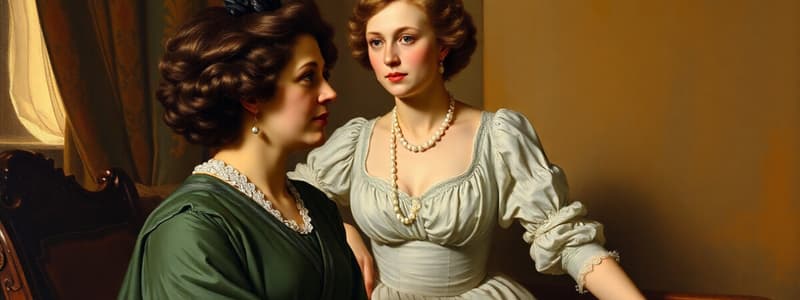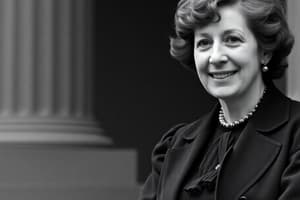Podcast
Questions and Answers
What characteristic of Jeannette Rankin's family dynamic is highlighted in her childhood?
What characteristic of Jeannette Rankin's family dynamic is highlighted in her childhood?
- They frequently engaged in peaceful discussions.
- They often expressed their emotions through arguing. (correct)
- They were known for quiet and calm interactions.
- They maintained a strict hierarchy in family roles.
Which statement best reflects Jeannette Rankin's educational experience?
Which statement best reflects Jeannette Rankin's educational experience?
- She was a straight-A student throughout her education.
- She was indifferent about her schooling and struggled academically. (correct)
- She excelled academically and loved school.
- She dropped out of school to pursue hat-making.
Which event or milestone is Jeannette Rankin famously known for?
Which event or milestone is Jeannette Rankin famously known for?
- Advocating for the rights of Native Americans in Congress.
- Starting a successful hat-making business.
- Being the first woman elected to Congress. (correct)
- Being the first woman to graduate from Montana State University.
How did Jeannette Rankin's father influence her views on conflict?
How did Jeannette Rankin's father influence her views on conflict?
What notable aspects of Jeannette Rankin's personality are described in the content?
What notable aspects of Jeannette Rankin's personality are described in the content?
How did Jeannette Rankin's early job at a milliner affect her?
How did Jeannette Rankin's early job at a milliner affect her?
What recurring theme can be seen in Jeannette Rankin's life as described?
What recurring theme can be seen in Jeannette Rankin's life as described?
What activity did Jeannette Rankin enjoy during her childhood?
What activity did Jeannette Rankin enjoy during her childhood?
What best describes Jeannette Rankin's feelings toward her domestic responsibilities?
What best describes Jeannette Rankin's feelings toward her domestic responsibilities?
What does Jeannette's father represent in her upbringing regarding Native Americans?
What does Jeannette's father represent in her upbringing regarding Native Americans?
What motivated Jeannette to start organizing local suffrage groups upon her return to Montana?
What motivated Jeannette to start organizing local suffrage groups upon her return to Montana?
Which significant event did Jeannette participate in on February 1, 1911?
Which significant event did Jeannette participate in on February 1, 1911?
What was Jeannette's experience upon voting for herself in the 1916 election?
What was Jeannette's experience upon voting for herself in the 1916 election?
What educational path did Jeannette pursue after her initial job in social work?
What educational path did Jeannette pursue after her initial job in social work?
What notable action did President Woodrow Wilson call for on the day Jeannette entered Congress?
What notable action did President Woodrow Wilson call for on the day Jeannette entered Congress?
How did Jeannette's campaign for Congress reflect her community organizing skills?
How did Jeannette's campaign for Congress reflect her community organizing skills?
What was Jeannette's reaction to the conditions she observed while taking her social worker's course?
What was Jeannette's reaction to the conditions she observed while taking her social worker's course?
What led to Jeannette's recognition at the national level in the suffrage movement?
What led to Jeannette's recognition at the national level in the suffrage movement?
Which emotions did Jeannette's friend express towards her behavior during the suffrage organizing efforts?
Which emotions did Jeannette's friend express towards her behavior during the suffrage organizing efforts?
What motivated Jeannette to consider running for Congress after women gained the right to vote in Montana?
What motivated Jeannette to consider running for Congress after women gained the right to vote in Montana?
What motivated Jeannette's belief that Congress should grant women the right to vote?
What motivated Jeannette's belief that Congress should grant women the right to vote?
Which state was the first to grant women the right to vote?
Which state was the first to grant women the right to vote?
What might have influenced western states to adopt women's suffrage earlier than eastern states?
What might have influenced western states to adopt women's suffrage earlier than eastern states?
What was Jeannette's stance on war?
What was Jeannette's stance on war?
By what year was Congress close to passing the Nineteenth Amendment?
By what year was Congress close to passing the Nineteenth Amendment?
What does the presence of a woman in Congress symbolize regarding women's suffrage?
What does the presence of a woman in Congress symbolize regarding women's suffrage?
What year did Wyoming become a state while allowing women to vote?
What year did Wyoming become a state while allowing women to vote?
What was a potential reason for women to have a strong role in the western frontier?
What was a potential reason for women to have a strong role in the western frontier?
What request did the doctor's wife make which impacted women's suffrage?
What request did the doctor's wife make which impacted women's suffrage?
Which notable argument did Jeannette present to lawmakers about women's suffrage?
Which notable argument did Jeannette present to lawmakers about women's suffrage?
Flashcards
Who was the first woman in Congress?
Who was the first woman in Congress?
Jeannette Rankin was the first woman elected to the United States Congress.
Where was Jeannette Rankin born?
Where was Jeannette Rankin born?
Jeannette Rankin was born in Montana before it became a state.
What was Jeannette Rankin's father's stance on war?
What was Jeannette Rankin's father's stance on war?
Jeannette's father was against war and believed it only led to more bloodshed.
What were Jeannette Rankin's personality traits?
What were Jeannette Rankin's personality traits?
Signup and view all the flashcards
What did Jeannette Rankin study and do after college?
What did Jeannette Rankin study and do after college?
Signup and view all the flashcards
What hobby did Jeannette Rankin enjoy?
What hobby did Jeannette Rankin enjoy?
Signup and view all the flashcards
What was Jeannette Rankin's family business?
What was Jeannette Rankin's family business?
Signup and view all the flashcards
Describe Jeannette Rankin's signature style.
Describe Jeannette Rankin's signature style.
Signup and view all the flashcards
What was Jeannette Rankin's childhood like?
What was Jeannette Rankin's childhood like?
Signup and view all the flashcards
What were Jeannette Rankin's political beliefs?
What were Jeannette Rankin's political beliefs?
Signup and view all the flashcards
Who was Jeannette Rankin?
Who was Jeannette Rankin?
Signup and view all the flashcards
What was Jeannette's background before entering politics?
What was Jeannette's background before entering politics?
Signup and view all the flashcards
How did Jeannette Rankin rise to prominence?
How did Jeannette Rankin rise to prominence?
Signup and view all the flashcards
What challenges did Jeannette Rankin face as a suffragist?
What challenges did Jeannette Rankin face as a suffragist?
Signup and view all the flashcards
What was Jeannette Rankin's historic achievement?
What was Jeannette Rankin's historic achievement?
Signup and view all the flashcards
How was Jeannette Rankin's victory received?
How was Jeannette Rankin's victory received?
Signup and view all the flashcards
What is Jeannette Rankin's lasting impact?
What is Jeannette Rankin's lasting impact?
Signup and view all the flashcards
What key lessons can be learned from Jeannette Rankin's life?
What key lessons can be learned from Jeannette Rankin's life?
Signup and view all the flashcards
Who was the first woman elected to the U.S. Senate?
Who was the first woman elected to the U.S. Senate?
Signup and view all the flashcards
Jeannette's argument for suffrage
Jeannette's argument for suffrage
Signup and view all the flashcards
Early women's suffrage in the West
Early women's suffrage in the West
Signup and view all the flashcards
Western states' motive for suffrage: Moral improvement
Western states' motive for suffrage: Moral improvement
Signup and view all the flashcards
Western states' motive for suffrage: Recognition of women's contributions
Western states' motive for suffrage: Recognition of women's contributions
Signup and view all the flashcards
Western states' motive for suffrage: Political favors
Western states' motive for suffrage: Political favors
Signup and view all the flashcards
The doctor's wife and suffrage
The doctor's wife and suffrage
Signup and view all the flashcards
Progress towards national suffrage
Progress towards national suffrage
Signup and view all the flashcards
The regional difference in suffrage
The regional difference in suffrage
Signup and view all the flashcards
Jeannette's argument about hypocrisy
Jeannette's argument about hypocrisy
Signup and view all the flashcards
Jeannette's stance on war
Jeannette's stance on war
Signup and view all the flashcards
Study Notes
Jeannette Rankin
- Born June 11, 1880 – May 18, 1973
- First woman elected to US Congress
- Lived in Montana
- Worked with family on a ranch
- Helped with chores, including cooking and running a hotel
- Known for strong personality and tantrums
- Did not enjoy school
- Opposed war
- Believed violence was ineffective
- Passionate advocate for women's suffrage
- Worked for reforms in Missoula's judicial and prison systems
- First person to address Montana lawmakers about suffrage in 1911
- Became involved in suffrage work in Washington State in 1910
- Elected to Congress in 1916
- One of the 49 representatives who voted against the war
- Was part of a Congressional group who voted against entering WWI
- Acted as an advocate against treatment of Native Americans
- Ran for Congress in 1916 and won
- Acted in the US House of Representatives from 1917-1919
- Supported Nineteenth Amendment
Studying That Suits You
Use AI to generate personalized quizzes and flashcards to suit your learning preferences.




